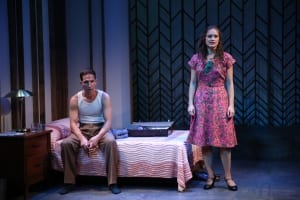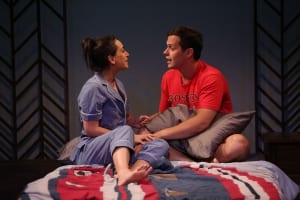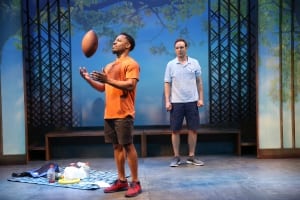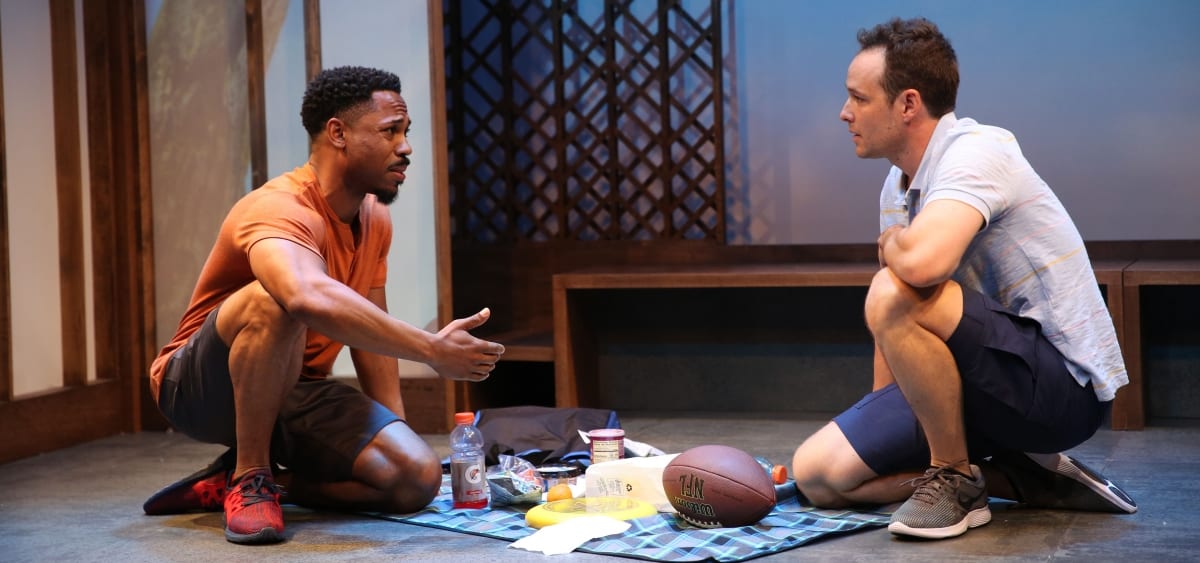In honor of the short form celebrated by 59E59 Theaters’ Summer Shorts Festival, I offer short takeaways from each of the fantastic plays in Series B. First, from Lucky: If you can’t find a place to call home, perhaps you can find a person.
Our first glimpse of Lucky is of Meredith (Christine Spang), a rain-soaked but otherwise perfect package of bright ingenue charm, making the heartbreak beneath all the more poignant. Her husband Phil (Blake Delong) hasn’t been heard from for years after being discharged from war. When she gets word that he’s quietly returned home and ensconced himself in a hotel, she goes to see him.

The word “PTSD” is never uttered, but it hangs between the couple like a stormcloud. He’s lost, he begins to say, he’s broken, he has to keep moving because nowhere feels like home. Every phrase packs an emotional punch. As it becomes clear that trauma is the reason he’s stayed away, a subtle but striking change occurs: a change in focus from Meredith to Phil, who is more of a fixture than a character for the first part of the show. But playwright Sharr White imbues Lucky with an innate curiosity towards him, which is only fully realized when the play’s quiet, awkward mood is broken its final stretch. Delong superbly delivers a strife-filled monologue, ending with him collapsing and sobbing into Meredith’s lap. It’s a touching and unforgettable visual.
From Providence: Small towns aren’t as sleepy as they look, despite what the 6 p.m. closing of their stores may suggest. The night before a wedding, Michael (Jake Robinson) and Renee (Blair Lewin) are wide awake in Michael’s childhood bed, innocently bickering as married couples do. And then we meet Pauly (Nathan Wallace), the jittery groom-to-be seeking some last-minute advice on how to do marriage right.

It’s a classic slice-of-life play, where nothing really changes from the beginning to the end. The actors all do a fine job within the simple framework of their story, but at the end of the day, Michael and Renee are still bickering about the present even after tenderly reminiscing on past highlights of their marriage to inspire Pauly. Pauly breathes a welcome energy into the show, but he’s written as more of an interruption, all but forgotten when Renee begins to have an existential crisis right after he leaves. (I’m wont to say it comes out of nowhere, but if an existential crisis is to happen anywhere, it’s at 3 a.m. in a small town.) It’s the sort of show that happens, and you nod, and you wish the characters the best as you contently part ways.
From Appomattox: Sometimes you have to decide between deeply knowing your friend and continuing to be their friend. This short is the searing pinnacle of the series. Frank (Ro Boddie) and Joe (Jack Mikesell) begin an innocent conversation about a news story in which students try to contribute reparations for a history of slavery at their university. The exchange turns vicious as they realize their ideas of what’s right, wrong, and enough don’t mesh.

It’s a difficult show to watch, but in a way that makes it all the more important. Frank, a black man, is at first fine to agree to disagree with Joe, a white man, about how much Joe’s race can do to truly make up for history. But Joe persists, and their emotions run higher and higher, and the sunny park soon becomes a Roman-style arena where we watch the friendship get ripped apart. Amidst the racial issues, the play also calls out toxic masculinity – “That’s just the way it is, most guys have superficial friendships, that’s why they last so f—ing long!” – in a moment where it looks like the pair might end up bonding before it comes crashing down. Both actors nail every nuance of their character’s personality, explored expertly in Neil LaBute’s script.
The best word for Appomattox is thought-provoking; it invites the viewer to examine their friendships and their convictions. And the best part about it, and all three plays, is that there is no clear right or wrong – just people, and what they think is best. If art imitates life, that’s one thing all the naturalistic, grounded shows in Series B do excellently.

